SCOTLAND THE BRAVE
SNP votes to demand independence if it wins majority of MPs at next general election
15 October 2023,
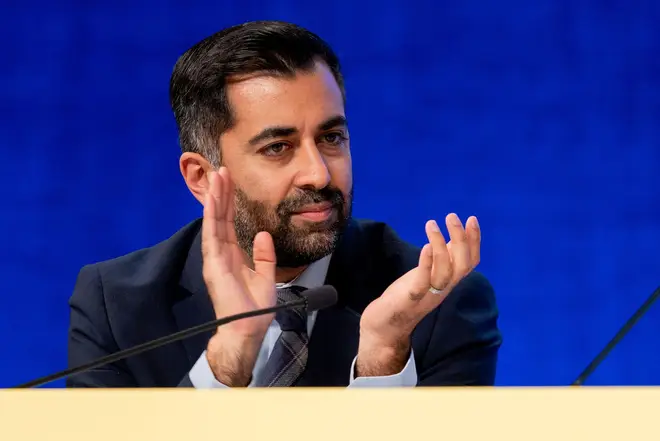
A radical shift in independence strategy has been backed by the SNP after Humza Yousaf won support for a plan which would see it demand negotiations with a new UK government if it wins a majority of seats at the next General Election
Delegates at the SNP conference in Aberdeen agreed the strategy just days ahead of the date, October 19, which their previous leader Nicola Sturgeon had promised them would see a second independence referendum held.
That plan was kicked into touch by the Supreme Court which ruled the Scottish Parliament did not have the power to unilaterally hold a referendum without UK government agreement.
Searching for a new strategy, the SNP has now agreed that if it wins a majority of MPs in Scotland it will have a mandate to discuss steps to independence with the new Prime Minister.
However the party, rejected proposals which would have seen it needing to win the majority share of the vote, 50% plus one, to open any talks on independence.
That "defacto referendum" idea had been initially propsed by Nicola Sturgeon just before she stepped down as leader, but Mr Yousaf said it would see the party "setting ourselves a bar no other party sets itself".
As a result, the new strategy means the SNP will have to win at least 29 constituencies, 15 fewer than it currently holds. Recent opinion polls have suggested that could be difficult for the SNP with Labour now neck and neck on voting intention.
But Mr Yousaf said that by putting "on page one, in line one" of the party's manifesto that a vote for the SNP is a vote for independence there could be no doubt in voters' minds what they were choosing.
As a result, he said, if they secured a majority of MPs that would secure a mandate to speak with the UK government about giving "democratic effect" to that vote. His preferred option is to hold a second independence referendum.
It was also agreed that the party would push for the power to hold a referendum to be transferred from Westminster to Holyrood, along with a tranche of other legal powers around employment law, energy company taxation, visas for overseas workers and new borrowing powers.
The party also agreed that if there was no movement from the UK government at that point, the next Holyrood election in 2026 would be used as a defacto referendum.
The First Minister said the current "Westminster roadblock" to holding a second referendum required the SNP to "use the next general election to put independence front and centre".
He added: "Let's not fall into the trap of setting ourselves a bar no other party sets itself to win. If the Westminster parties want a test for popular support (for) the proposition of independence, let's do it via a referendum. If they give us the powers I will hold the referendum tomorrow.
"But in an election a majority of seats is a victory, plain and simple."
His comments came as he claimed that "Westminster is running scared and denying democracy".
Mr Yousaf said: "Westminster is denying Scotland a democratic referendum - that tells you precisely who fears democracy and no wonder."
He went on: "While setting our Westminster goal as winning a majority of seats....if we win that majority that will be our mandate to begin negotiations with the UK Government of how to put into democratic effect the decision of the Scottish people."
His comments came as he insisted the need for Scotland to become independent had never "been more urgent" as people struggle amid the cost-of-living crisis.
"Now is the time to inspire people to show them the better country we can build with the powers of independence," the SNP leader said.
However he stressed to his party's supporters that there "is no short cut that will get us to independence", with Mr Yousaf arguing that "listening, campaigning, persuading" were necessary.
He added: "After today's debate let us agree we come together and work like we have never worked before to deliver a better future for our country."
Proposing an amendment calling for a change to a "majority" of the vote, Mr Wishart said the approach would present a "credible and realistic route" to independence.
He also urged delegates to reject an amendment by fellow MP Tommy Sheppard which called for the party's manifesto to demand the "permanent transfer of legal powers" to hold an independence referendum.
Mr Wishart said: "By all means, vote for amendment A if you want, but all you are actually going to be doing is giving Westminster something new to say no to."
He added: "Our one job is to deliver a result which demonstrates that a majority of the people of Scotland want to become an independent nation.
"It will give us the real credibility when we approach international institutions, we will have Scotland's express consent to redesign our relationship with Westminster."
The new strategy was slammed by pro-union organisation Scotland in Union. Chief executive Pamela Nash said: “This entire debate confirmed how out-of-touch the SNP is with the people of Scotland.
“In a cost-of-living crisis, only the nationalists would spend time talking to themselves about convoluted constitutional processes. The SNP’s latest incoherent attempt to use the General Election as a proxy for separation still involves trying to use the contest as a ‘de facto referendum’, and that is an utter insult to voters.
“The next election must be about the people’s priorities; not the SNP’s.”
Scottish Conservative constitution spokesman, Donald Cameron MSP said: "The SNP will alawys put their relentless pursuit iof independence above everything else.
"Humza Yousaf and SNP are committed to wasting more taxpayers money on independence rather than addressing the real priorities of Scotland. The country can't afford five more years of the SNP's obsession."
Can the SNP's independence plan change the union's future?
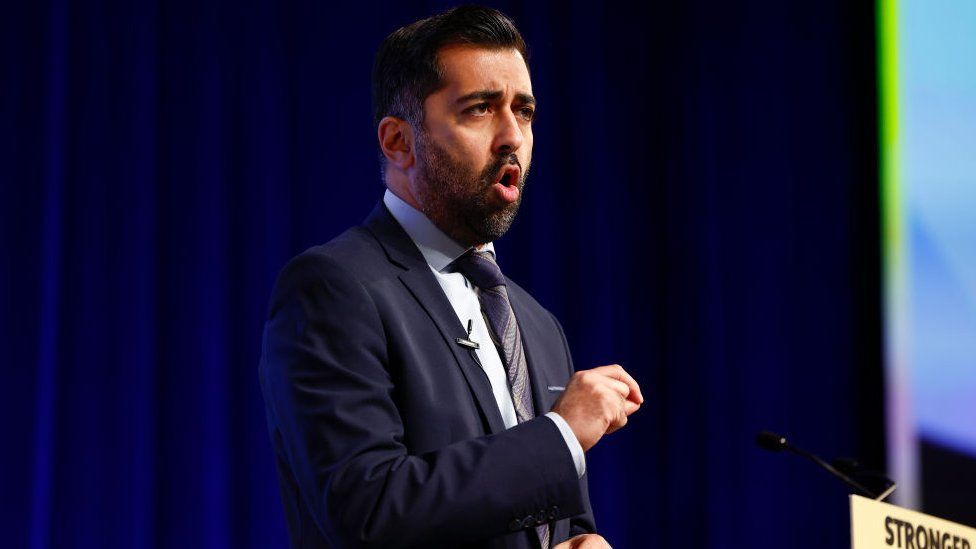 GETTY IMAGES
GETTY IMAGESPatience and unity. That is what the Scottish National Party leader, Humza Yousaf, wants from his party now.
Addressing the SNP's annual conference in Aberdeen, in a much smaller hall than the one it used at great expense last year, Mr Yousaf sought to temper the expectations of SNP members who are hungry for immediate change.
His key line — "there is no shortcut that will get us to independence" — was a signal to delegates that he wants the SNP to focus on building a clear and sustained majority in favour of leaving the UK.
"We must move on," he insisted, "from talking about process to talking about policy.
Success, he said, would require listening, campaigning and persuading. In other words, "not talking about the how of independence," but talking about the why.
Nonetheless, the conference did in fact spend a large chunk of Sunday afternoon talking about 'the how'.
In the end, delegates voted overwhelmingly in favour of Mr Yousaf's strategy, stepping back from the idea floated by his predecessor, Nicola Sturgeon, of treating the next general election as a referendum in all but name.
Instead the party will demand an actual referendum if it wins a majority of Scottish constituencies at Westminster — 29 seats — even though it won 48 in 2019.
"I trust Humza on this," Emily Cheung, a delegate from Edinburgh, told me, adding: "I think he's a very charismatic guy and, honestly, if there's anyone who can bring people over, it's probably him."
Tackle 'twin crises'
Mr Yousaf said the SNP would put the constitution front and centre in the campaign, with line one of the party's manifesto reading "vote SNP for Scotland to become an independent country".
Both Labour and the Conservatives have previously made it clear that they regard such talk as a waste of air, insisting that they will block a second referendum on independence.
The SNP's attempts, along with the Scottish Green Party, to use their current pro-independence majority at Holyrood to hold one have already been stymied by the UK government's refusal to grant consent, and by the Supreme Court's ruling that the Scottish Parliament does not have the right to do so alone.
Perhaps with that in mind, delegates here in Aberdeen also voted for London to devolve more powers to Edinburgh to tackle what were described as the "twin crises" of the cost of living and climate change.
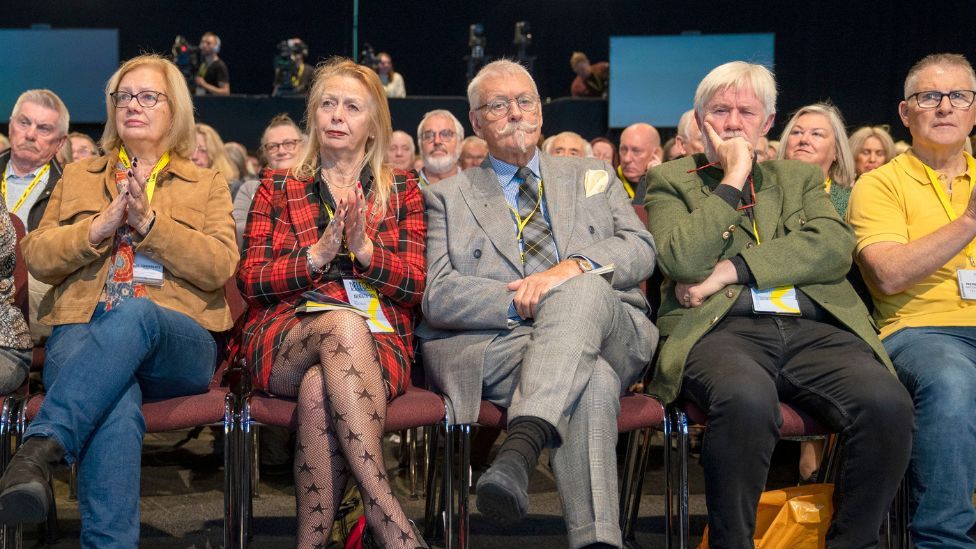 PA MEDIA
PA MEDIAAmong the items on the list were control over employment rights and the minimum wage, windfall taxes on energy companies, and employment visas for overseas workers.
Those ideas were proposed by Tommy Sheppard, the SNP MP for Edinburgh East, who told me that, if all else failed, the party's fall-back position was to return to the idea of a de facto referendum on independence at the 2026 Scottish parliamentary election.
"The opportunity is there, should we need it," he said, to "consider using that election to allow people in Scotland to decide yes or no, do they want to move forward to independence."
This hedging of bets reflects concern in senior SNP circles about polls which suggest Labour could pick up 20 or more Scottish seats at a general election which is expected to be held next year.
Such a result would be a significant setback for the SNP which has been the main engine of the independence movement at least since its 1967 by-election victory in Hamilton, South Lanarkshire.
SNP machine in trouble
From the turn of the century, Alex Salmond and Nicola Sturgeon used the power base provided by the opening of the new Scottish Parliament to turn the SNP into both a party of government and a formidable campaigning machine, eventually securing a referendum in 2014.
Although the people of Scotland voted to remain in the UK by 55% to 45%, that was not the end of the road for the SNP.
In 2015, the party swept the board at the general election, taking 56 of Scotland's 59 seats in the House of Commons.
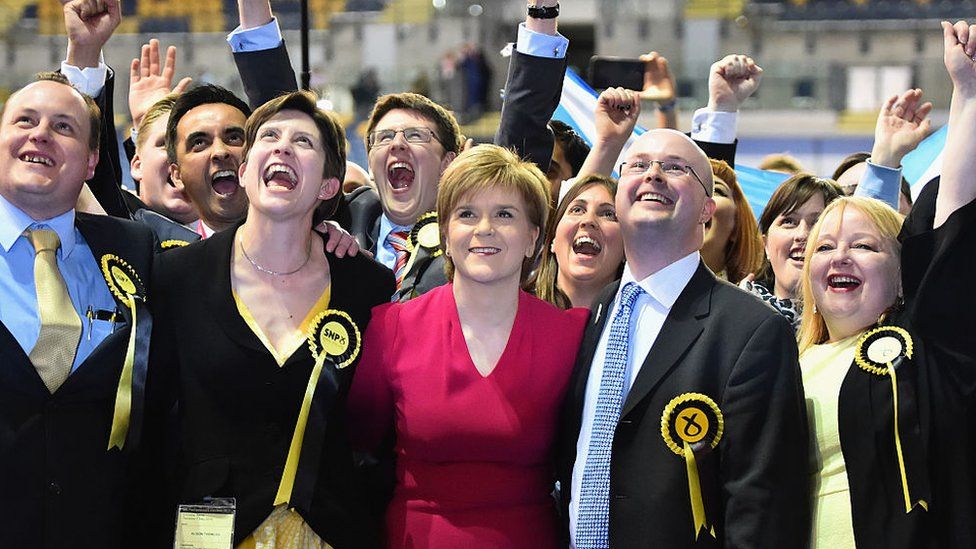 GETTY IMAGES
GETTY IMAGESBut by the time Mr Yousaf narrowly won the leadership in March, that machine was in trouble. Seven months on, the gears are crunching, the wheels are wobbling and the engine is spluttering.
There are many reasons why.
First, governing devolved Scotland since 2007 has brought challenges as well as opportunities.
Running the nation's hospitals and schools as well as administering some taxes and benefits, soaked up a lot of time and effort, especially during the pandemic.
The result, say some critics of the SNP inside the independence movement, is that the party has taken its eye off the prize and now represents a cosy new establishment in Edinburgh when it should be laser-focused on planning for a new state.
Supporters of the 316-year-old union with England, including Labour and the Conservatives, make the mirror-image claim, alleging that Scotland's public services are in a dire state and that the reason is the SNP's 'obsession' with independence.
'Bread and butter issues'
The past two weeks have been particularly bruising for the SNP with the loss of one Westminster seat to Labour in the Rutherglen and Hamilton West by-election and another to the Tories, with the defection of Lisa Cameron, who represents East Kilbride, Strathaven and Lesmahagow.
Then there is the police investigation into the funding and finances of the SNP which has, in Mr Yousaf's description, engulfed his party.
Ms Sturgeon; her husband, the former chief executive Peter Murrell; and the former treasurer Colin Beattie have all been arrested, and subsequently released without charge.
And yet polls suggest that a slump in support for the SNP has not been accompanied by a fall in support for independence, which continues to hover just below 50%.
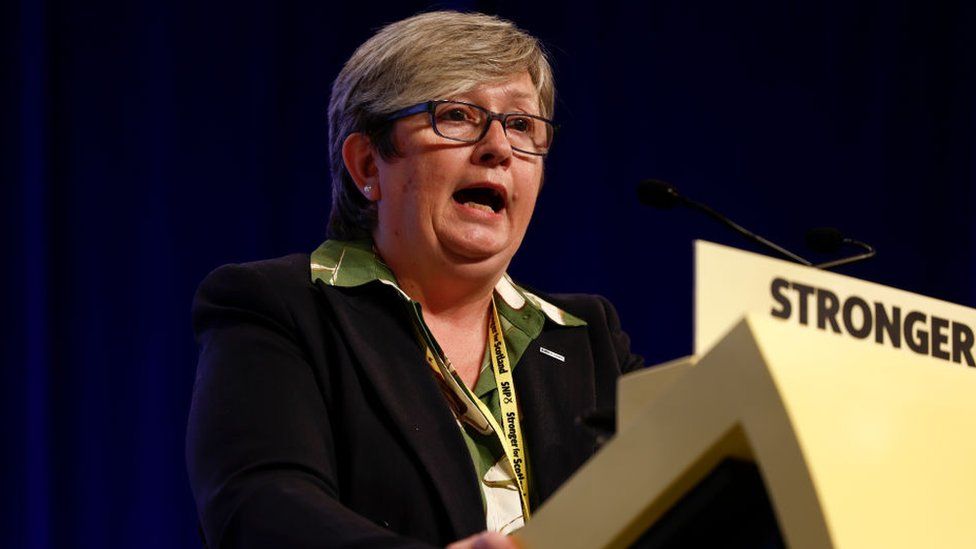 GETTY IMAGES
GETTY IMAGESJoanna Cherry KC, the SNP MP for Edinburgh South West, and a thorn in the side of Ms Sturgeon during her tenure as leader, said her party needed to take heed.
Ms Cherry's amendment to the independence plan, calling for a constitutional convention made up of MPs, MSPs and "representatives of civic Scotland" to take forward negotiations with the UK government, was approved by delegates.
"Let's be honest," she told me, "we're going down in the polls at the moment and we need to address that by getting back to talking about bread and butter issues, the issues that really matter to people," adding "we have to link that to our independence offering."
Whether or not the party can do so successfully may determine the future of the United Kingdom itself.
SNP Could Lose MPs Next Year And Still Demand Independence Negotiations With UK Government
The party has agreed on yet another new policy on how to break up the United Kingdom.
By Kevin Schofield
15/10/2023

Humza Yousaf welcomed the new policy.
JANE BARLOW - PA IMAGES VIA GETTY IMAGES
The SNP could lose more than a dozen MPs at next year’s general election and still claim they have a mandate for Scottish independence.
At the party’s autumn conference in Aberdeen, delegates agreed that having a majority of Scottish MPs at Westminster would be enough to trigger negotiations with the UK government.
That means the party’s target is having at least 29 MPs, which is 14 fewer than they have at the moment.
Under the Westminster voting system, they could even achieve that total with less than 40% of the vote.
A Scottish Labour source told HuffPost UK the SNP’s position was “an absolute farce”.
“They will declare independence if they lose seats but get a majority of Scottish MPs,” the source said. “The public won’t take them seriously any more.”
The new policy is a shift from what was previously proposed by SNP leader Humza Yousaf, who had claimed that just having the most Scottish MPs was enough to begin talks with Westminster on breaking up the UK.
Previous SNP leader Nicola Sturgeon, who resigned in February, had wanted to turn the next election into a “de facto referendum”, meaning more than 50% of votes for pro-independence parties would have been enough for Scotland to leave the UK.
But that policy was ditched by Yousaf when he succeeded her in March.
The UK government has repeatedly refused to agree to the SNP’s demands for another Scottish independence referendum.
In November last year, the Supreme Court ruled that the Scottish Parliament does not have the power to stage its own referendum.
Yousaf told the SNP conference: “Come together and work like we’ve never worked before to deliver a better future for our country.”
Shadow Scottish secretary Ian Murray said: “This latest farcical strategy from the SNP is a complete distraction while Scots are struggling.
“The cost of living has never been higher, and our public services are at breaking point, but the SNP want to debate amongst themselves how losing seats in a general election can lead to independence.”
But Scottish Conservative constitution spokesperson Donald Cameron said: “Humza Yousaf and the SNP are committed to wasting more taxpayers’ money on independence, rather than addressing the real priorities of Scotland.”
No comments:
Post a Comment